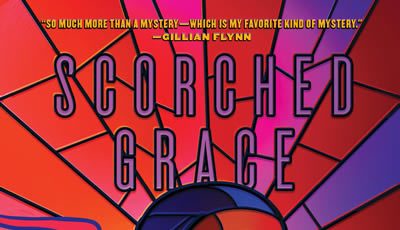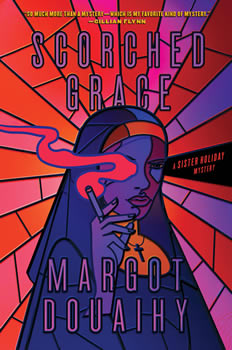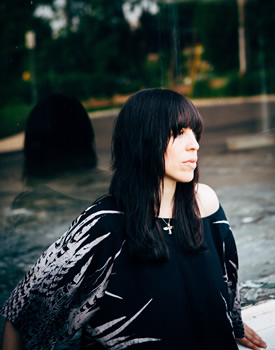

Features BookTrib Spotlight: Margot Douaihy
A Young, Tatted-Up Nun Takes on Murder
We’re always there, us nuns, to witness, to hold space for miracles in the terror, in the boredom, in the wretched gore of life. To take it in, watch your hands tremble, validate your questions, honor your pain. You never see us seeing you.
Nuns are slippery like that.
The speaker in Margot Douaihy’s SCORCHED GRACE is Sister Holiday, at 33 the youngest nun in New Orleans’ Sisters of the Sublime Blood by about 40 years. She got there after spectacularly blowing up her life in Brooklyn—her family, her girlfriend, her punk band: “Betrayal and guilt were well-worn paths in the junkyard of my brain”—and this was the only place that would take her in. She is genuinely religious, but no one quite knows what to make of her: “Not that I knew what to make of a nun like me—gold tooth from a bar fight, black scarf and gloves concealing my tattoos, my black roots pushing through badly bleached hair.”
She’s spent her time cleaning, atoning, teaching guitar in the local parochial school until, a year in, while taking a smoke break in the alley behind the school—“Vice on the Sabbath, I know. Not my finest moment. But carpe diem.”—the school explodes into flame, and a body falls from the second floor. She rescues a teenage boy, is severely hurt herself, and instantly becomes obsessed with finding out what happened.
She’s solved minor mysteries before (missing rosaries, snatched spectacles), and is convinced she can do this: “A nun and a sleuth have much in common. Both camouflage in the open. And, go ahead and try, but you cannot wear us out. We’re as patient and stubborn as blood.”
Patience and stubbornness can only take you so far, however. More calamities rain down, more deaths occur, the police and a highly inquisitive woman fire investigator named Maggie Riveaux, 5’ 4” with a “fuck-it attitude,” start to look at her askance, and evidence begins to pile up that points to Sister Holiday herself. But she can’t stop: “Obsession kept me going. What would I have if I stopped? What else would I lose if I kept going?”
In the end, the answers to those questions, and everyone else’s, will be nothing like what she or anyone expects—a fiery apocalypse and a rebirth that will leave readers stunned. This is no cozy. It is a story about love and faith and despair, and Margot Douaihy has created an instantly memorable character—edgy, headstrong, hardboiled, deeply flawed, darkly funny, with a voice that crackles and burns with passion and wit. Sister Holiday may not know where she’s headed, but you’ll follow her anywhere.
SCORCHED GRACE is not only Douaihy’s debut novel, it’s the first book in the highly anticipated new imprint from the great Gillian Flynn. “Within five pages,” Flynn said, “I was in love with this novel.” You will be, too.
“The first spark was my desire to contribute a fresh take on the sleuth story,” Douaihy says. “Mysteries are one of my evergreen interests. For as long as I can remember, I have loved reading and watching mysteries. PBS Mystery! was one of the few shows that could unite all members of my family. I tore through the Encyclopedia Brown and Nancy Drew books, then Golden Age whodunnits, and on to hardboilers. I may have been the only kid in Scranton who dressed up as Poirot for Halloween.
“Even when the narrative focus is bleak, a mystery engages me with ecstatic immersion. As a writer, I gravitate toward noir and hardboiled works because they confront life’s toughest realities. They are usually voice-driven tales led by hardnosed, hard-drinking, hardheaded, and unsentimental protagonists. A hardboiler often starts with the recognition that the world is broken, and to solve a case will restore order for a brief moment. You’ll get burned, your head will throb, you might lose a tooth, but it’s still worth it; it’s worth the pain. These hallmarks fuel SCORCHED GRACE.
“My lone wolf sleuth is a young, chain-smoking, tatt’d up nun, Sister Holiday. Even with her strange signatures, Sister Holiday is the opposite of today’s garden variety narcissist. She has no Twitter or iPhone. She’s not saying, ‘Look at me!’ or trying to be funny to accrue social currency. She exploits people’s preconceived notions about nuns to advance her sleuthing. She’s propelled by something deeper—a sense of purpose (even if it’s misguided). Sister Holiday is insufferable at times, with her own occlusions, agonizing paradoxes, and solipsism. Sealed logic interests me as a narrative predicament.
“I lived and worked in New Orleans for two years (not long enough), and I planned to craft a mystery series set there. New Orleans is the most important American city, in my opinion, at turns vital, haunting, and beautiful. ‘Place’ is its own character in my book, mirroring externality and interiority.”
Douaihy is also a talented teacher, editor, and poet. How did poetry influence her in the writing of this novel?
“When I started writing at the age of 12, poetry was my default setting, the voice of my heart, my emotional extruder. Running along a parallel track were mysteries. Eventually I merged my two loves: poetry and crime writing.
“While poetry traffics in wordplay, emotions, and the abstract, and crime fiction centers on puzzles and investigative methods, the forms are intertwined. Just look at the poetry and mysteries of Edgar Allen Poe—his gorgeously ghastly Tell-Tale Heart and Murders in the Rue Morgue. Poe’s Inspector Dupin mysteries play with interpretation, voice, nuanced rhythms, and symbolism. They are weird as hell and devastatingly well written. They still feel peculiar and alive to me, even though they were published in the 1800s.
“Poetry and crime writing overlap in countless ways in my practice. I’m interested in ciphers, metaphors as ways of seeing and feeling, and the partialities that shape awareness. Detective fiction is an epistemological form, and poetry holds nested inquiries. I leverage poetic devices to complicate scenes, stir curiosities, and create actively queer spaces.
“Besides Poe, I love the poetry and prose mysteries of Jorge Louis Borges, Margaret Atwood, Chris Abani, and Arthur Conan Doyle. Raymond Chandler’s prose achieves a poetic balance of evocative, seductive, and tell-it-like-it-is narration.”
And the influences continue on. “Hardboiled tropes create a shared understanding—a shared language. They can also be limiting and utterly damaging if they perpetuate harmful stereotypes. Art and culture have real consequences for real people. I view genre constraints as invitations to innovate. It’s also fun to think of variation within genre; Mickey Spillane’s hardboiled prose is stylistically different from work by Dashiell Hammett and Raymond Chandler. Neo-hardboiled writers like Walter Mosley and Sue Grafton continued the wisecracking PI lineage with their incisive books that wove racial, gender, and socioeconomic analysis into whodunnits. Social comment adds thematic texture.
“I keep returning to the cynical, devil-may-care brio in Raymond Chandler’s mean streets. His prose is my favorite of all canonical hardboilers. ‘Trouble is my business’ is the metanarrative. Chandler’s PI Marlowe, who I view as an intertextual nod to Captain Marlow in Conrad’s Heart of Darkness, admits he is ‘depressed.’ Marlowe is the kind of guy who laughs when a crooked cop is pistol-whipping him. There’s a delicious nihilism that rings true. He’s also a drunk and a jerk who is unkind (often terrible) to women, gay people, and basically anyone who isn’t a cishet white male. Noir writer and scholar Megan Abbott points to Marlowe’s brutishness as a kind of gender panic—‘masculinity in crisis.’ This rich complexity astounds me.
“Sister Holiday fancies herself as a both a PI Marlowe inheritor and a corrective. [Spoiler alert] She sets herself on track to become a part-time PI, in addition to being a full-time nun with the Sisters of the Sublime Blood. Faith and wisecracks are to Sister Holiday what snark and whiskey are to PI Marlowe. We all have to make it through the day. Somehow.”
Is there any of Sister Holiday in the author? “I wish. Sister Holiday is my superhero. And she’s a hot mess. She can’t get out of her own way. Her focus borders on obsession, and that narrative energy, along with her specters, guide her through the space/time of this series. While I am gay, tattooed, and I love mysteries, I’m very different from Sister Holiday. Despite the optics, she is a genuinely devout nun, and I am not actively religious. I was raised in the Lebanese Maronite Catholic faith, though, and I find comfort in ritual. Asterisk: There is apparently a 14th -century nun in my Douaihy family tree. Sister Holiday makes enemies and is estranged from her family. She doesn’t care what people think. I love my friends and family, and I foreground empathy. It’s important to craft characters who keep us guessing and disappoint us. Characters should be dynamic (round) figures who can be difficult and contradictory to refract and reflect the contours of real people.
“I am passionate about queer, intersectional feminist storytelling with teeth. Give me stories with fangs and fault lines. I wanted to write a lesbian protagonist and a story that doesn’t fit into a box, while giving readers fertile genre territory and characters that will live on in their minds (and minds’ eyes). I also wanted to narrativize institutional power and trauma in different ways.”
Being a teacher and an editor helped, too. “Everything I tell my students, I practice: Writing is a process. We must think about the emotional lives of stories and characters. Pair the creative imagination with technical skill. Craft, craft, craft plus channeling the muse. Writing is hard work because it is life-giving work. Take risks. Plumb ideas deeply. Push the material to the very very edge. It’s crucial to situate ourselves in writerly lineages even as we break molds. Creative writing is a living, evolving art form. I learn from my students every single day. Indeed, I will always be a student.
“I tell this to myself and to every student and writer I know: Don’t give up. Keep taking risks. Be bold. Double down on your inquiries, your obsessions, your urgent aesthetic. Read widely and generously. Decolonize bookshelves and classrooms. Read everything you can get your hands on. To paraphrase Jan Beatty, my erstwhile professor and college mentor: Good writing will find its way into the world. It just might not happen on the timeline you’d prefer. Keep writing. Keep investing in your voice.”
As to her own timeline: “I had the insane good luck to meet my agent, Laura Macdougall, via email, because of a writing contest I had entered. I didn’t win the contest, haha, but she liked my writing style. Probably because of my wacky poetic quotient and the fact that I was trying to do something different. After a few emails and revisions, Laura offered to represent me. Laura Macdougall is one of the smartest literary agents working today, devoted to LGBTQ authors. She managed to share my novel with Zando’s exceptional team—my brilliant editor, Sareena Kamath, and Gillian Flynn, the queen of domestic noir. They took a chance on me and Sister Holiday, and I will be forever grateful. It is a gift beyond measure to have SCORCHED GRACE serve as the inaugural title of Gillian Flynn Books. It’s the most feverish of fever dreams.”
Next up, “I’m wrapping Blessed Water, the second novel in the Sister Holiday Mystery series with Gillian Flynn Books/Zando. Whereas SCORCHED GRACE crackles with heat, fire, and flames, Blessed Water is drenched with rain, floods, tears, curses, and blood. And in 2023, I will help adapt SCORCHED GRACE for the screen, with Stone Village TV and some sensational producers and writers (stay tuned!).”
*****
Neil Nyren is the former EVP, associate publisher, and editor in chief of G.P. Putnam’s Sons and the winner of the 2017 Ellery Queen Award from the Mystery Writers of America. Among the writers of crime and suspense he has edited are Tom Clancy, Clive Cussler, John Sandford, C. J. Box, Robert Crais, Carl Hiaasen, Daniel Silva, Jack Higgins, Frederick Forsyth, Ken Follett, Jonathan Kellerman, Ed McBain, and Ace Atkins. He now writes about crime fiction and publishing for CrimeReads, BookTrib, The Big Thrill, and The Third Degree, among others, and is a contributing writer to the Anthony/Agatha/Macavity-winning How to Write a Mystery.
He is currently writing a monthly publishing column for the MWA newsletter The Third Degree, as well as a regular ITW-sponsored series on debut thriller authors for BookTrib.com and is an editor at large for CrimeReads.
This column originally ran on Booktrib, where writers and readers meet.
- LAST GIRL MISSING with K.L. Murphy - July 25, 2024
- CHILD OF DUST with Yigal Zur - July 25, 2024
- THE RAVENWOOD CONSPIRACY with Michael Siverling - July 19, 2024



